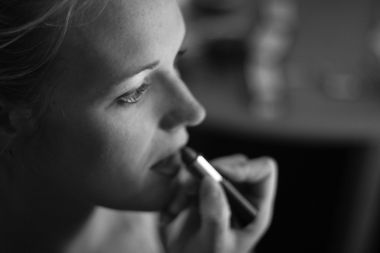Could the selfie redefine beauty?

Despite campaigns telling us to embrace our natural beauty, a new study has found that the average woman spends 13 hours a day fully made-up, leaving just 11 hours with her face cosmetic-free.
Researchers commissioned by health and wellbeing brand Beurer asked 2,000 women about their beauty routines and found that most admitted to spending more time with make-up on than off and spend around £121 on products every year.
Over half, 58 per cent, said they leave cosmetics on all evening if they are expecting friends to pop in, while a quarter admitted to keeping make-up on until after half past ten at night and a whopping 38 per cent said they frequently go to bed with all their makeup intact.
Nearly 20 per cent said they won't open the door without makeup, and a tenth admitted that how good they feel goes hand in hand with how many cosmetics they are wearing. Over half said they feel far less confident when barefaced and the same percentage admitted they dread bumping into anyone when they have forgone a full face of makeup.
These worrying trends can be attributed at least in part to the marketing-obsessed age in which we live, where women are bombarded daily with images and advertisements that tell us what and how we should be eating, wearing, behaving and looking.
It is impossible to say for certain how many ads we are exposed to during a typical day, though estimates range between 400 and 2,000. That means women are encouraged to compare themselves to the advertising industry's standard of beauty hundreds of times every single day.
No wonder so many women can't imagine going barefaced and struggle with eating disorders, self-harm and the other effects of low self-esteem - we are constantly reminded of our failure to measure up to a fabricated ideal.
Dove's Real Beauty campaign and 'Self-esteem Project' are part of a movement that is seeking to transform the way in which we see beauty, and change our cultural perceptions of what it is to look 'perfect'.
The international brand is now encouraging people to use selfies to encourage a fresh approach to defining beauty through social media, and have released a video in which the power of self-taken photographs to reveal natural beauty is explored.
"The way women are defining beauty today is changing dramatically, and social media has much to do with the change," says Cynthia Wade, Academy Award winning producer of the short documentary.
"Now, we have the ability to photograph the beauty we see in our friends and ourselves. When we share these diverse images on our social networks, we are taking personal ownership and truly redefining beauty."
A noble aim, it remains to be seen whether the selfie is the answer or whether it simply opens up young people to greater scrutiny about their physical appearance, and the plethora of apps that allow us to touch-up, blur out or filter our portraits, all to 'improve' the way we look in accordance with cultural values. It might be fun to take photos, but is this just giving the selfie more credit than it's due?











